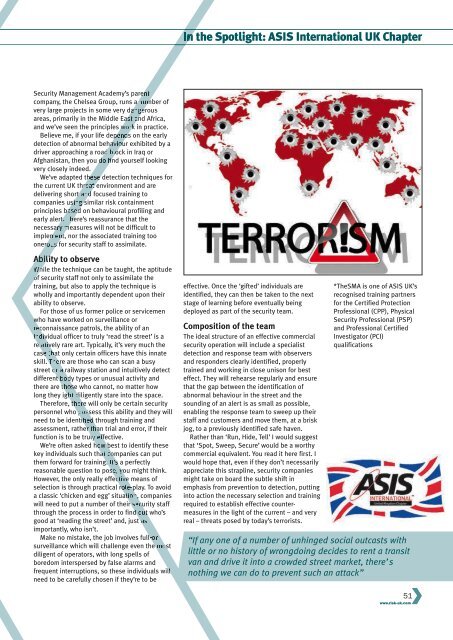RiskUKSeptember2017
You also want an ePaper? Increase the reach of your titles
YUMPU automatically turns print PDFs into web optimized ePapers that Google loves.
In the Spotlight: ASIS International UK Chapter<br />
Security Management Academy’s parent<br />
company, the Chelsea Group, runs a number of<br />
very large projects in some very dangerous<br />
areas, primarily in the Middle East and Africa,<br />
and we’ve seen the principles work in practice.<br />
Believe me, if your life depends on the early<br />
detection of abnormal behaviour exhibited by a<br />
driver approaching a road block in Iraq or<br />
Afghanistan, then you do find yourself looking<br />
very closely indeed.<br />
We’ve adapted these detection techniques for<br />
the current UK threat environment and are<br />
delivering short and focused training to<br />
companies using similar risk containment<br />
principles based on behavioural profiling and<br />
early alert. There’s reassurance that the<br />
necessary measures will not be difficult to<br />
implement, nor the associated training too<br />
onerous for security staff to assimilate.<br />
Ability to observe<br />
While the technique can be taught, the aptitude<br />
of security staff not only to assimilate the<br />
training, but also to apply the technique is<br />
wholly and importantly dependent upon their<br />
ability to observe.<br />
For those of us former police or servicemen<br />
who have worked on surveillance or<br />
reconnaissance patrols, the ability of an<br />
individual officer to truly ‘read the street’ is a<br />
relatively rare art. Typically, it’s very much the<br />
case that only certain officers have this innate<br />
skill. There are those who can scan a busy<br />
street or a railway station and intuitively detect<br />
different body types or unusual activity and<br />
there are those who cannot, no matter how<br />
long they ight diligently stare into the space.<br />
Therefore, there will only be certain security<br />
personnel who possess this ability and they will<br />
need to be identified through training and<br />
assessment, rather than trial and error, if their<br />
function is to be truly effective.<br />
We’re often asked how best to identify these<br />
key individuals such that companies can put<br />
them forward for training. It’s a perfectly<br />
reasonable question to pose, you might think.<br />
However, the only really effective means of<br />
selection is through practical role-play. To avoid<br />
a classic ‘chicken and egg’ situation, companies<br />
will need to put a number of their security staff<br />
through the process in order to find out who’s<br />
good at ‘reading the street’ and, just as<br />
importantly, who isn’t.<br />
Make no mistake, the job involves full-on<br />
surveillance which will challenge even the most<br />
diligent of operators, with long spells of<br />
boredom interspersed by false alarms and<br />
frequent interruptions, so these individuals will<br />
need to be carefully chosen if they’re to be<br />
effective. Once the ‘gifted’ individuals are<br />
identified, they can then be taken to the next<br />
stage of learning before eventually being<br />
deployed as part of the security team.<br />
Composition of the team<br />
The ideal structure of an effective commercial<br />
security operation will include a specialist<br />
detection and response team with observers<br />
and responders clearly identified, properly<br />
trained and working in close unison for best<br />
effect. They will rehearse regularly and ensure<br />
that the gap between the identification of<br />
abnormal behaviour in the street and the<br />
sounding of an alert is as small as possible,<br />
enabling the response team to sweep up their<br />
staff and customers and move them, at a brisk<br />
jog, to a previously identified safe haven.<br />
Rather than ‘Run, Hide, Tell’ I would suggest<br />
that ‘Spot, Sweep, Secure’ would be a worthy<br />
commercial equivalent. You read it here first. I<br />
would hope that, even if they don’t necessarily<br />
appreciate this strapline, security companies<br />
might take on board the subtle shift in<br />
emphasis from prevention to detection, putting<br />
into action the necessary selection and training<br />
required to establish effective countermeasures<br />
in the light of the current – and very<br />
real – threats posed by today’s terrorists.<br />
*TheSMA is one of ASIS UK’s<br />
recognised training partners<br />
for the Certified Protection<br />
Professional (CPP), Physical<br />
Security Professional (PSP)<br />
and Professional Certified<br />
Investigator (PCI)<br />
qualifications<br />
“If any one of a number of unhinged social outcasts with<br />
little or no history of wrongdoing decides to rent a transit<br />
van and drive it into a crowded street market, there’s<br />
nothing we can do to prevent such an attack”<br />
51<br />
www.risk-uk.com

















